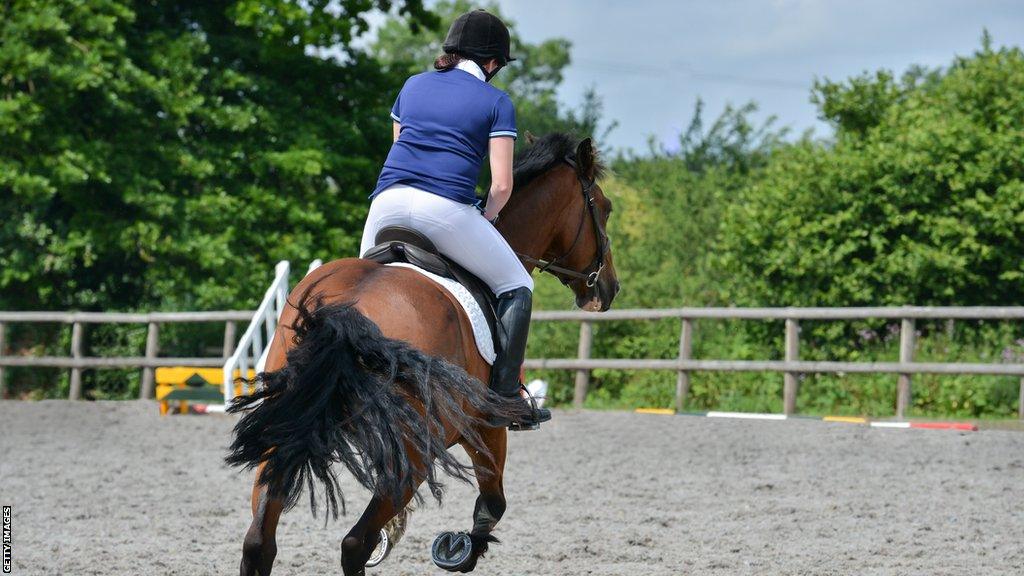Equestrian: Report finds bullying, race and class bias 'commonplace'
- Published

The research was commissioned by British Equestrian and its member bodies, and carried out by an independent company
Bullying is "commonplace" and race and class bias are "perpetuated" within equestrian sports, research has found.
A report, commissioned by national governing body British Equestrian, found themes of bullying and "negative racialised experiences" were raised "strongly" by study participants.
Among other key themes raised in the report, equestrian activity was deemed to be "elitist and classist".
British Equestrian chief executive Jim Eyre said it "made for tough reading".
He added: "Overall, there were some very positive messages around the value, benefits and latent demand of equestrian.
"We can now turn these into meaningful change and use as part of our wider commitment around social impact across the equestrian industry. We must now seize this chance fully to make a real difference."
'A huge opportunity to diversify'
The research, carried out by AKD Solutions, was commissioned by British Equestrian and its member bodies in a bid to understand the barriers faced by ethnically diverse communities and those who are socioeconomically underserved.
Respondents were recruited from these two main groups - with questions put both to those engaged in equestrian activity and those who were not.
Of 634 respondents to AKD's survey, 55% were black, 26% were white, 14% were Asian, and 5% identified as being from 'other' ethnic backgrounds, including Middle Eastern and Latin American. The annual household income of 56% of respondents was between £10,000-£49,999.
The research found:
76% of respondents said they agreed with the statement "people like me are under-represented in horse riding and other horse related activities".
61% said a lack of finances stopped them from accessing the "full benefits" of equestrian activity.
24% felt racial discrimination adversely affected their ability to fully access and benefit from equestrian activity.
33% of white respondents agreed or strongly agreed that working in an equestrian environment was a viable career option, compared with 6%, 10% and 16% of those from a black, Asian or mixed race background respectively.
The report said: "Themes of bullying and racialised experiences emerged strongly among participants currently involved in equestrian activity.
"Participants stated bullying was commonplace within riding schools and liveries, with many equestrian environments feeling emotionally unsafe for them.
"In interviews, black participants recalled a number of instances where bullying within riding schools and liveries was racialised, and interviewees spoke of moving liveries due to this, even when incurring significant additional cost."
Some participants in the study reported feeling that horses were allocated "based on a manager's preference and favourites" and that any concerns were "pushed aside, played down or ignored".
One respondent said there was a "a common misconception" that "just because you're black, you can't afford things", while another said it was "often presumed that she was without the financial means to participate" because she is a woman from a mixed race background.
As a result of the study's findings, AKD has set out 11 recommendations for British Equestrian to consider.
These include a "universal commitment to anti-racist and anti-classist equestrian environments", and "leading from the front on diversity".
AKD said the report presented a "huge opportunity to diversify equestrianism", but British Equestrian and its member bodies must "address issues of ethnic inclusivity, affordable access, diverse representation, funding, and operational support for equestrian centres in ways that embody anti-racist and anti-classist values".
In response, British Equestrian said it was "committed" to "leading from the front and embodying the change that we strive for", as well as "holding ourselves to account" and "staying resilient" in the quest for "lasting change".
Chair Malcolm Wharton said: "This is an important day for British Equestrian and our member bodies as we strive to create a community that is truly representative of society and where all participants feel welcome, included and free from discrimination.
"It was a huge step to directly engage with those in the ethnic and underserved communities and get their feedback, but a vital one.
"The insight gained from this research puts us in a much stronger position to effect meaningful, systemic change and provides a foundation from which to make plans to deliver results, which will have impact on generations to come."